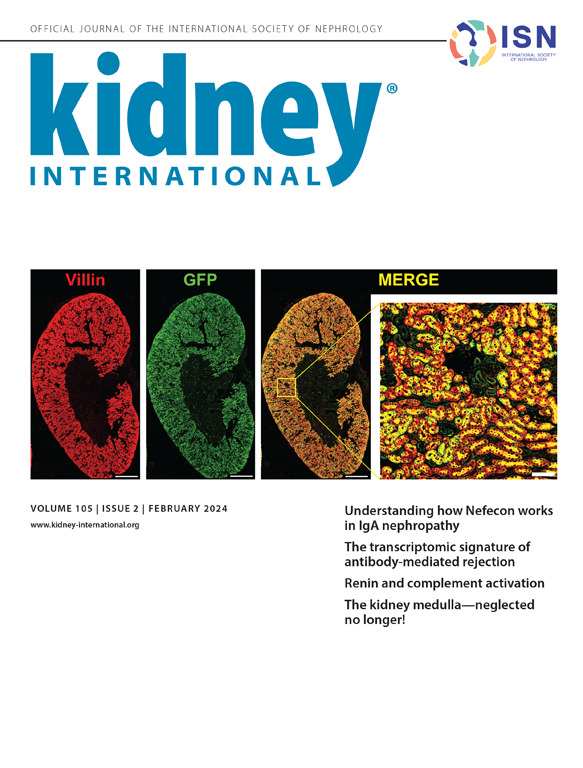CRISPR-Cas9 mediated proteinase 3 autoantigen deletion as a treatment strategy for anti-neutrophil cytoplasmic autoantibody-associated vasculitis.
IF 14.8
1区 医学
Q1 UROLOGY & NEPHROLOGY
引用次数: 0
Abstract
INTRODUCTION Proteinase 3 (PR3) is a major autoantigen in patients with anti-neutrophil cytoplasmic autoantibody (ANCA)-associated vasculitis (AAV). Here, we performed a proof-of-principle study using ex vivo CRISPR-Cas9 guided gene editing to eliminate the PR3 autoantigen as an alternative to suppressing the autoimmune response to PR3. METHODS A ribonucleoprotein (RNP) complex of Cas9 protein and a PR3-specific single guide-RNA was transfected into human CD34+ hematopoietic stem and progenitor cells (HSPC) by electroporation. Effects on PR3 protein abundance, neutrophil differentiation, and ANCA-dependent and -independent neutrophil responses were assessed. RESULTS Gene editing introduced a frame shift in exon 2 of PRTN3. Consequently, PR3 protein was efficiently reduced in neutrophil-differentiated HSPCs as demonstrated by immunoblotting, ELISA, microscopy, and the complete absence of PR3-specific proteolytic activity. Human neutrophil elastase served as control and was not affected. PR3-deleted (PR3KO)- and PR3 wild-type (PR3WT)-HSPCs showed similar neutrophil differentiation. Importantly, general neutrophil defense functions to non-ANCA receptor-independent and -dependent stimuli were similar in PR3KO- and PR3WT-neutrophils as was constitutive apoptosis. Flow cytometry showed that cell membrane-PR3 was significantly reduced on PR3KO-neutrophils and consequent neutrophil activation to either monoclonal antibodies to PR3 or human PR3-ANCA was attenuated. In contrast, myeloperoxidase-ANCA stimulation was not affected. CONCLUSIONS We show the feasibility and efficacy of depleting the PR3 autoantigen in human CD34+ HSPCs using CRISPR-Cas9. Depleting the PR3 autoantigen instead of suppressing the autoimmune response to PR3 could potentially lead to drug-free remission, particularly in patients with refractory or relapsing disease.CRISPR-Cas9介导的蛋白酶3自身抗原缺失作为抗中性粒细胞细胞质自身抗体相关血管炎的治疗策略
蛋白酶3 (PR3)是抗中性粒细胞胞浆自身抗体(ANCA)相关血管炎(AAV)患者的主要自身抗原。在这里,我们进行了一项原理验证研究,使用体外CRISPR-Cas9引导的基因编辑来消除PR3自身抗原,作为抑制PR3自身免疫反应的替代方法。方法电穿孔法将Cas9蛋白的核糖核蛋白(RNP)复合物和pr3特异性的单导rna转染到人CD34+造血干细胞和祖细胞(HSPC)中。评估对PR3蛋白丰度、中性粒细胞分化以及anca依赖性和非依赖性中性粒细胞反应的影响。结果基因编辑导致PRTN3外显子2的帧移位。因此,PR3蛋白在中性粒细胞分化的HSPCs中被有效地减少,通过免疫印迹、ELISA、显微镜和PR3特异性蛋白水解活性的完全缺失证实了这一点。人中性粒细胞弹性酶作为对照,不受影响。PR3缺失型(PR3KO)和PR3野生型(PR3WT)- hspcs表现出相似的中性粒细胞分化。重要的是,PR3KO-和pr3wt -中性粒细胞对非anca受体依赖性和非anca受体依赖性刺激的一般防御功能与组成性凋亡相似。流式细胞术显示,pr3ko -中性粒细胞上的PR3明显减少,中性粒细胞对PR3单克隆抗体或人PR3- anca的激活减弱。相反,髓过氧化物酶- anca刺激不受影响。结论利用CRISPR-Cas9技术,验证了在人CD34+ HSPCs中去除PR3自身抗原的可行性和有效性。消耗PR3自身抗原而不是抑制自身免疫对PR3的反应可能会导致无药物缓解,特别是对于难治性或复发性疾病的患者。
本文章由计算机程序翻译,如有差异,请以英文原文为准。
求助全文
约1分钟内获得全文
求助全文
来源期刊

Kidney international
医学-泌尿学与肾脏学
CiteScore
23.30
自引率
3.10%
发文量
490
审稿时长
3-6 weeks
期刊介绍:
Kidney International (KI), the official journal of the International Society of Nephrology, is led by Dr. Pierre Ronco (Paris, France) and stands as one of nephrology's most cited and esteemed publications worldwide.
KI provides exceptional benefits for both readers and authors, featuring highly cited original articles, focused reviews, cutting-edge imaging techniques, and lively discussions on controversial topics.
The journal is dedicated to kidney research, serving researchers, clinical investigators, and practicing nephrologists.
 求助内容:
求助内容: 应助结果提醒方式:
应助结果提醒方式:


